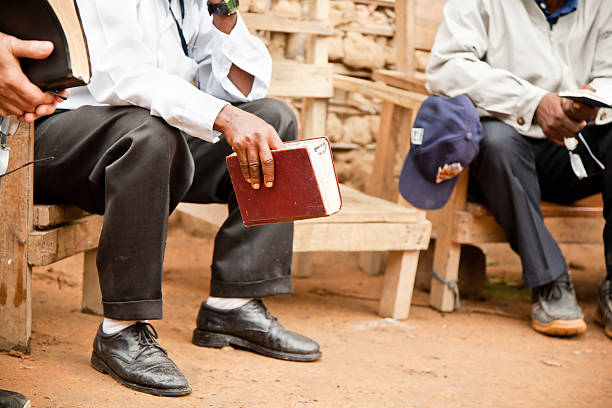25 Reasons Missionary Work is Important for Church Growth

25 Reasons Missionary Work is Important for Church Growth
Table of Contents
- Global Evangelism
- Cultural Exchange
- Humanitarian Aid
- Discipleship
- Building Churches
- Community Development
- Medical Missions
- Education
- Empowering Women
- Orphan Care
- Social Justice
- Disaster Relief
- Language Translation
- Interfaith Dialogue
- Prison Ministry
- Youth Engagement
- Environmental Stewardship
- Peacebuilding
- Spiritual Warfare
- Church Planting
- Technology and Media
- Community Transformation
- Crisis Counseling
- Training Indigenous Leaders
- Healing Ministries
Mission work is vital for churches as it embodies the core values of Christianity.
It extends the church's reach, spreading the good news and fostering spiritual growth.
Missionaries engage in diverse activities, from evangelism to humanitarian aid, addressing physical and spiritual needs.
This outreach contributes to global evangelism, builds bridges between cultures, and promotes understanding.
Mission work empowers believers to live out the Great Commission, demonstrating Christ's love through practical actions.
It's a transformative force that expands the church's impact, offering hope, compassion, and a tangible expression of God's love to the world.
There are many reasons why missionary work is important for the church. Here are 25 reasons Missionary work is important to our local and global churches.
Global Evangelism: Missionary work spreads the message of Christianity to different parts of the world, reaching those who may not have heard it otherwise.
Following the Great Commission, missionaries embody the call to share the message of Christ globally.
The Holy Spirit empowers these efforts, breaking down cultural barriers and allowing the transformative message of Christianity to touch hearts that might not encounter it otherwise.
By engaging in global evangelism, churches actively participate in fulfilling their mandate to make disciples of all nations, contributing to the growth and vibrancy of the worldwide body of believers.
Cultural Exchange: Missionaries engage with diverse cultures, fostering understanding and creating bridges between communities.
Mission work is vital for churches as it facilitates a meaningful cultural exchange.
Motivated by the Gospel of Jesus Christ, Missionaries immerse themselves in different societies, fostering understanding and building connections between communities.
Through missionary service, they become bridges linking local churches with diverse cultures.
This cultural exchange broadens perspectives and contributes to the rich tapestry of the global Church.
It emphasizes the unity found in the message of Christ while celebrating the beautiful diversity within the body of believers engaged in mission work worldwide.
Humanitarian Aid: Missionaries often provide crucial assistance, including medical care, education, and relief efforts, addressing physical and spiritual needs.
Mission work holds immense importance for churches, not just in spreading the Word of God but also in offering practical help.
Inspired by the teachings of the New Testament, missionaries engage in humanitarian aid, providing essential services like medical care, education, and relief efforts.
This dual approach addresses communities' physical and spiritual needs, reflecting the Kingdom of God.
Through such endeavors, mission work becomes a tangible expression of the love and compassion embedded in the Gospel, demonstrating that the message of Christ extends beyond words to impactful deeds.
Discipleship: Missionaries play a key role in discipleship, helping individuals deepen their understanding of the Christian faith and grow as followers of Christ.
Inspired by the early church, missionaries actively engage with communities, fostering spiritual growth among church members and those they serve.
Through shared experiences and teachings, missionaries contribute to expanding discipleship, allowing individuals from various backgrounds to deepen their understanding of the Christian faith.
This process strengthens the local church and promotes a sense of unity among people groups, embodying the inclusive and transformative nature of discipleship within the broader mission work.
Building Churches: Missionaries contribute to establishing churches and Christian communities in areas where they may be scarce.
Mission work holds immense importance for churches as it involves building churches and Christian communities where they are needed most.
Missionaries, driven by the Holy Ghost's guidance, actively construct places of worship and foster Christian fellowship.
This foundational work provides spaces for God's people to gather and ensures that the most important thing—the spreading of the gospel—is facilitated in regions that may not have had access to such spiritual resources before.
Community Development: Missionary projects often involve community development initiatives, uplifting societies by addressing economic and social challenges.
Mission work is vital for churches as it goes beyond spreading the gospel—it actively engages in community development.
Missionary projects, undertaken by dedicated individuals, aim to uplift societies facing economic and social challenges.
Whether it's the first time a community hears the gospel or the support provided to new believers navigating a difficult time, these initiatives reflect the holistic nature of mission work.
By addressing various aspects of community life, missionaries contribute to positive change, embodying the transformative impact of the gospel on both individuals and the societies they serve.
Medical Missions: Many missionaries bring medical expertise to underserved areas, improving healthcare and demonstrating Christ's love through healing.
Mission work holds crucial importance for churches, especially in medical missions.
Numerous missionaries, including young women committing to full-time missions, bring essential medical expertise to underserved areas.
By improving healthcare access, these missions address physical needs and become powerful expressions of Christ's love through healing.
This multifaceted approach exemplifies the Great Commission's call to make disciples of all nations, showing that mission work encompasses diverse service forms, including crucial healthcare provisions.
Education: Missionaries establish schools and educational programs, empowering communities through knowledge and skill development.
Mission work is vital in education as missionaries establish schools and educational programs. Beyond spreading the gospel message of Christ Jesus, these initiatives empower communities through knowledge and skill development.
Missionary training centers contribute to the equipping of individuals not only for temporal success but also for the profound impact of eternal life.
In addition to providing material goods, these educational efforts become instrumental in shaping lives and communities, reflecting the holistic approach of mission work in advancing practical skills and spiritual understanding.
Empowering Women: Missionary work often includes empowering women, promoting equality, and addressing gender-based issues.
Mission work holds significance in empowering women, addressing gender-based issues, and fostering equality.
Missionary teams actively engage in initiatives that uplift and support women, recognizing their crucial role in communities. Beyond traditional roles, these efforts contribute to the broader goal of societal transformation.
From church planting to high school education, missions strive to empower women in various aspects, promoting a more inclusive and equal world.
In the United States and around the globe, mission work becomes a vehicle for positive change, striving to create communities where all individuals, regardless of gender, can flourish.
Orphan Care: Missionaries frequently engage in orphan care, providing love, support, and resources to vulnerable children.
Missionaries, often passionate about helping vulnerable children, establish programs that provide love, support, and resources.
This extends beyond geographical boundaries, becoming a great example of Christian compassion and care.
Whether through a Christian college, missions agency, or collaboration with new people, orphan care is a testament to mission work's transformative power.
It reflects the belief that caring for orphans is not just a good deed but an embodiment of the Christian principle of extending love to those in need, highlighting the only way to create lasting positive change.
Social Justice: Missionaries advocate for social justice, addressing human trafficking, poverty, and inequality.
Mission work is significant for churches as it involves gospel workers actively advocating for social justice. Missionaries with important skills significantly address human trafficking, poverty, and inequality.
Their actions are guided by relevant Bible verses, emphasizing the biblical mandate to seek justice and show compassion.
By engaging in mission work, churches build relationships and foster positive change in communities, aligning with the broader mission of promoting God's love, mercy, and justice in a world where these issues persist.
Disaster Relief: Missionaries respond to natural disasters, offering immediate relief and participating in long-term recovery efforts.
Mission work is crucial for churches, especially in disaster relief. Drawing inspiration from the Book of Acts, missionaries act as a beacon of hope during natural disasters.
They navigate language barriers to provide immediate relief and actively participate in long-term recovery efforts.
Their dedication aligns with the spirit of community and selfless service in the early Christian church.
Engaging youth groups in these efforts also fosters a sense of compassion and solidarity, teaching young generations the importance of responding to human suffering with love and practical support.
The church can leverage its resources, including volunteers, funding, and facilities, to provide immediate assistance to those affected by natural disasters, such as hurricanes, earthquakes, and floods.
In addition, churches can collaborate with other organizations and government agencies to ensure that relief efforts are coordinated and effective.
By offering practical support, such as shelter, food, and medical care, the church can demonstrate Christ's love through its actions, offering hope and healing to those who have experienced loss and trauma.
Through disaster relief efforts, the church can make a tangible difference in the lives of those affected by disasters, providing a powerful witness to the gospel's transformative power.
Language Translation: Missionaries contribute to translating the Bible into various languages, making the Scriptures accessible to diverse communities.
Mission work holds immense importance for churches as missionaries actively contribute to translating the Bible into diverse languages.
They are part of God's larger plan, acting as vital members of a team dedicated to making the Scriptures accessible to the vast majority of people worldwide.
This linguistic outreach ensures that the transformative message of the Bible reaches individuals in their native languages, breaking down barriers and fostering a deeper connection between communities and the timeless truths found in God's Word.
Interfaith Dialogue: Missionaries engage in respectful dialogue with people of other faiths, fostering understanding and promoting religious tolerance.
Mission work is vital for churches as missionaries engage in interfaith dialogue, contributing to respectful conversations with people of other faiths.
This kind of missionary work fosters understanding and promotes religious tolerance.
By being church members involved in this good work, missionaries play a crucial role in building bridges between different religious communities, creating opportunities for shared understanding, and ultimately contributing to a world where diverse beliefs coexist harmoniously.
Prison Ministry: Missionaries reach out to those in prisons, offering spiritual guidance and support for rehabilitation.
Missionaries engage with individuals in prisons, bringing the good news of hope, redemption, and spiritual guidance.
They are vital in reaching this unique mission field, offering rehabilitation support and addressing people's spiritual needs in challenging circumstances.
Through prison ministry, missionaries extend the church's reach, demonstrating God's love and grace to individuals seeking solace and transformation.
Youth Engagement: Missionary programs often include activities and outreach tailored to engage and support young people.
Mission work holds great importance for churches, particularly in youth engagement. Missionary programs are designed to actively involve and support young people, aligning with the discipleship mission of spreading God's glory.
Through activities and outreach efforts, missionaries connect with the youth, following the example set by the apostle Paul to disciple the next generation of believers and foster a vibrant, faith-filled community.
Environmental Stewardship: Some missionaries incorporate environmental initiatives, promoting responsible stewardship of God's creation.
Mission work proves vital for churches, and in recent years, some missionaries have embraced environmental stewardship.
Through short-term mission trips and initiatives guided by a mission president, they actively promote responsible care for God's creation.
This expansion into environmental efforts aligns with a holistic approach to mission work, recognizing the interconnectedness of faith and sustainable practices.
By engaging in initiatives prioritizing environmental stewardship, missionaries contribute to a broader understanding of God's creation and the call to care for it, embodying the message of love and responsibility for our world.
Peacebuilding: Missionaries work towards peace and reconciliation in areas affected by conflict, promoting unity and understanding.
Mission work holds immense importance for churches as it extends beyond spreading the gospel, encompassing vital aspects like peacebuilding.
Missionaries actively engage in initiatives that foster unity and understanding in areas affected by conflict in foreign countries.
Their efforts go beyond traditional evangelism, seeking to address social and political issues and bring the transformative message of peace.
By embodying the teachings of Christ and working toward reconciliation, missionaries play a crucial role in promoting stability and healing in communities.
This multifaceted approach reflects the holistic impact that mission work can have on individuals and societies, showcasing the church's commitment to being agents of positive change in the world.
Financial support from church members often enables these crucial initiatives, emphasizing the collective responsibility in the name of the Father to contribute to global peacebuilding efforts.
Spiritual Warfare: Missionaries engage in spiritual warfare, praying for and addressing spiritual strongholds in different regions.
Mission work holds profound significance for churches, encompassing a dimension of spiritual warfare where missionaries actively pray and address spiritual strongholds in diverse regions.
Recognizing the importance of invoking the guidance and protection of the Heavenly Father, missionaries undergo thorough training in missionary training centers, equipping them for the challenges they may face.
The concept of spiritual warfare goes beyond physical and tangible efforts, emphasizing the crucial role of prayer, faith, and perseverance.
Missionary teams, often consisting of dedicated individuals committed to converting and baptisms, understand the spiritual battles faced in various contexts.
This aspect of mission work underscores the broader scope of the church's mission, acknowledging the spiritual realm and the transformative power of prayer to spread the gospel and advance the Kingdom of God.
Church Planting: Missionaries focus on establishing new churches, contributing to the growth and expansion of the Christian Church.
Church planting stands as a cornerstone of the missionary endeavor, reflecting the tireless efforts of Christian missionaries to establish new churches and contribute to the growth and expansion of the Christian Church.
The importance of missions is vividly illustrated through the missionary experience, where dedicated individuals venture into different regions, often with the support of a sending church.
These Christian missionaries, driven by a genuine commitment to spreading the gospel, play a vital role in bringing the message of Christ to unreached areas.
As they establish new congregations, they foster the growth of the local church and contribute to the broader mission of building a global community of believers.
The significance of mission work in church planting resonates deeply with the foundational principles of Christianity, emphasizing the Great Commission's call to make disciples of all nations.
Through the commitment and perseverance of missionaries, churches are planted, communities are transformed, and the love of Christ is shared in places where it may not have been known before.
Technology and Media: Missionaries leverage technology and media to reach a wider audience with the Christian message.
In the contemporary landscape, the importance of mission work for churches is magnified by integrating technology and media into the missionary effort.
Missionaries harness the power of digital platforms, social media, and online communication tools to reach a wider audience with the Christian message.
This dynamic approach allows for real-time engagement with people around the globe, breaking down geographical barriers and facilitating instantaneous connections.
Embracing technology is good for prospective missionaries as it opens new and innovative avenues for sharing the gospel.
Using multimedia resources, online platforms, and virtual communities amplifies the impact of mission work, enabling churches to connect with individuals who may not have been accessible through traditional methods.
As technology continues to advance, its integration into mission work becomes a valuable tool for churches to fulfill their mission of spreading the message of Christ to every corner of the world.
Community Transformation: Missionary efforts often lead to holistic transformation, impacting every aspect of community life.
Mission work catalyzes community transformation, weaving a tapestry of change that touches every facet of life.
As missionaries bring the gospel to new peoples, their impact transcends spiritual realms, igniting a great passion for holistic well-being.
Communities experience a metamorphosis as new Christians are equipped with a fresh skill set, empowering them to contribute to their surroundings' social, economic, and cultural fabric.
The ripple effect of mission work is profound, fostering a sense of unity, purpose, and hope. It goes beyond the individual conversion, reaching into the core of communities and sparking positive change that lasts.
This transformation is a testament to the enduring power of missionary endeavors, demonstrating the inherent connection between spiritual renewal and the flourishing of communities.
As churches engage in mission work, they become architects of positive change, leading and inspiring a legacy of growth, empowerment, and a shared journey toward a better, more fulfilling life for all.
Crisis Counseling: Missionaries provide emotional and spiritual support during times of crisis, offering hope and comfort.
Mission work plays a significant role in crisis counseling, offering a beacon of hope and comfort during challenging times.
Missionaries, often sent by a home church, engage in the work of the ministry by building relationships and providing much-needed emotional and spiritual support.
In moments of crisis, whether natural disasters, conflicts, or personal struggles, missionaries stand as compassionate counselors, sharing the love of Christ.
Their presence and words become a source of strength, guiding individuals and communities through the storm.
This aspect of mission work underscores the global immediate and practical impact that churches can have.
It is a testament to the holistic nature of mission endeavors, extending beyond traditional boundaries to meet people in their most vulnerable moments, demonstrating the transformative power of God's love in times of crisis.
Training Indigenous Leaders: Missionaries invest in training local leaders, ensuring sustainable growth within communities.
Mission work holds great importance for churches, particularly in training indigenous leaders.
Missionaries respond to God's call, dedicating their time and efforts to empower young men in communities worldwide.
Through the work of full-time missionaries, there is a deliberate investment in cultivating leadership skills among the local population.
This approach ensures that the growth and impact within these communities are immediate and sustainable.
By training indigenous leaders, mission work lays the foundation for self-sufficiency and long-term success.
It reflects a model of empowerment, allowing individuals within the community to take up leadership roles and guiding their fellow community members toward spiritual and social development.
In essence, this aspect of mission work embodies the principle of passing on the torch, fostering a legacy of leadership that will continue to flourish long after the missionaries have departed.
Healing Ministries: Some missionaries engage in healing ministries, praying for physical, emotional, and spiritual healing in the name of Christ.
Mission work is crucial for churches through healing ministries led by missionaries.
These dedicated individuals, often part of a team and considered church members, engage in a great work of compassion and service.
They embody the teachings of Christ, reaching out to communities with prayers for healing—both physical and emotional.
This aspect of mission work not only addresses immediate needs but also creates a profound impact on the future.
The influence of healing ministries extends beyond the physical realm, fostering spiritual well-being and demonstrating the love and mercy of Christ.
By actively participating in these ministries, future missionaries are inspired to carry on this great work, perpetuating a cycle of compassion and care within the church and beyond.
Through healing ministries, mission work becomes a transformative force, bringing comfort, hope, and a tangible expression of God's love to those in need.
Mission work holds profound importance for churches as it embodies the essence of Christianity's call to love and serve others.
Beyond geographical boundaries, missions extend the church's reach, bringing the transformative message of faith to diverse communities.
It's a dynamic expression of the Great Commission, urging believers to go into the world and share the good news.
Mission work fosters cultural exchange, encouraging mutual understanding and unity among diverse groups.
Moreover, it fulfills the biblical mandate to care for the vulnerable, providing humanitarian aid, education, and medical assistance.
Through mission work, churches actively engage in discipleship, empowering individuals to deepen their faith and live out Christ's teachings.
This global outreach not only impacts the lives of those served but also enriches the spiritual lives of church members, broadening their perspectives and commitment to a life of love and service.
In essence, mission work is a tangible expression of Christian love, compassion, and the transformative power of faith in action.
SHARE:






















